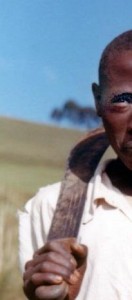Simon Kuper wrote in the FT today (April26th 2014) about inequality being the new apartheid and how unfondly he remembered the old one back in South Africa.
“I remember white South African liberals bemoaning apartheid while their black maid served supper. Most of them didn’t want to end apartheid. They just liked liberal talk.”
I grew up in times I used to think were different to now, but the older I get the more I don’t think they are at all. There were 1200 children at my school. Two were black. I don’t know if that’s changed and this wasn’t some elite fee-paying school, just the ordinary school in an ordinary West Country town. There just weren’t many black people there, it was as simple as that. There weren’t many opportunities for integration for that reason too. It wasn’t that we weren’t into multi-culturalism. We just didn’t have a multiplicity of cultures.

But the kids whose parents had come down from London set out to cure all of that. Love Thy Neighbour and Till Death Us Do Part were taken as part-documentary, part training film. The unbelievable Um Bongo advert (Um Bongo, Um Bongo, they drink it in the Congo just in case your memory, hopefully, has blotted it out) was sung with gusto in the swimming pool changing rooms, that hot-bed of closet gayness where masculinity was supposed to be demonstrated by staring at and commenting on the size of other people’s cocks.
It was a different time. Maybe. People now beginning to think about retiring from Thatcher-fuelled careers in accountancy but also actuaries, doctors and builders alike all happily larded conversations with words Nigel Farage probably says to his bathroom mirror. A sentence that didn’t include the word coon or wog was a sentence wasted according to one graduate of the London School of Economics, to my certain knowledge.
But I also met someone at university whose family had managed to get themselves asked to leave South Africa for being too white liberal by the apartheid government. I was reminded about her when I read Simon Kuper.
She told me about the time when after standing up for the blicks to the extent the government didn’t like it, that Swapo or Zanu or someone decided to raid her parents’ house, waiting for her father to come home. Because they were opposed to discrimination they didn’t have a gun in the house. And also because they’d planned in advance he drove past; they left an innocent-looking postcard in the window next to the front door. If it was safe to come in you took the card down. If the card was up you didn’t go in the house. The card was up.
The raiders got bored and took themselves and their pangas away. Her father and the whole family lived to get out of South Africa another day.
I asked what had happened to the cook, the gardener and the pool boy.
“Oh, they wint thir.’
They were taken by Zanu or Swapo or whoever it was?
“Nah, they knew it was going to hippen. It’s wit they’re lak.”
Pity. I’d quite liked her before that.

